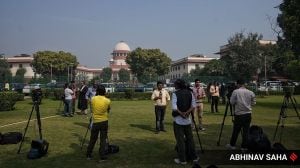Weak implementation of SC/ST Act leading to more discrimination, say Karnataka Dalit activists after employee’s suicide
The police are primary implementers of the SC/ST Act but they tend to work towards compromises, said P Yashoda, Dalit activist and convenor of the Committee for Monitoring and Strengthening SC/STs in Karnataka.
 Vivek Raj (35) died on June 4. (Express photo)
Vivek Raj (35) died on June 4. (Express photo) A day before he died, Vivek Raj, 35, a Dalit design graduate from NIFT filed a complaint against his managers at private apparel firm Lifestyle International in Bengaluru stating that he had been subjected to caste abuse at his workplace. A video he released prior to his death indicated that he had to run around before an assistant commissioner of police facilitated the filing of the police complaint against his managers under the Scheduled Castes and Scheduled Tribes (Prevention of Atrocities) Act, 1989.
Raj’s death has brought into focus the lack of systems for addressing caste discrimination issues despite the SC/ST (Prevention of Atrocities Act) of 1989 spelling out a series of measures to prevent and stop caste-based discrimination in society.
“The rules under the SC/ST Atrocities Act apply to all – including private companies but enforcing the law in corporations is difficult. The discrimination is at a covert level,” said P Yashoda, Dalit activist and convenor of the Committee for Monitoring and Strengthening SC/STs in Karnataka (CMASK).
In 2020, CMASK filed a PIL in the Karnataka High Court against the poor implementation of the SC/ST Prevention of Atrocities Act in the state by the government. Among the things that she pointed out was the failure of the state government to convene bi-annual meetings of a high-power vigilance committee headed by the chief minister to oversee instances of SC/ST atrocities and devise mechanisms to prevent these incidents.
In February this year, a Karnataka High Court division bench headed by Chief Justice P B Varale – which is still monitoring the state government implementation of the SC/ST Act – pulled up the then BJP government for failing to show resolve in implementing the recommendations of the law.
“The state government cannot be only a mute spectator in such matters. When the Act provides for at least two statutory meetings to be conducted in the calendar year, not conducting even a single meeting for one year, is certainly not in compliance with the assurance given to this court. We accept that the state government, in future, would not commit such laxity and shall strictly adhere to the provisions of the Act and rules,” the high court division bench ruled on February 14, 2023.
Following the high court stricture, the state government under then CM Basavaraj Bommai held a meeting of the high power vigilance committee, Yashoda said. “The only way that instances of caste abuse and discrimination will come down in society is through the strict implementation of the SC/ST PoA Act but no government has shown interest in implementing the provisions of the law,” she added.
“There are no measures available in private firms in cities for addressing discrimination on caste lines. In government firms, there are some mechanisms like SC/ST associations. But, for legal recourse, the SC/ST Prevention of Atrocities Act is the only way,” said B C Nagaraj, a Dalit activist from the Shivamogga region.
In 2020, soon after the PIL was filed by CMASK, the Karnataka High Court noted that out of 35,091 cases registered under the SC/ST Prevention of Atrocities Act between 2015 and 2019, charge sheets were filed in only 6,451 cases. While the Bengaluru Urban region has not had high numbers of atrocity cases registered in the past, there has been a spike more recently with 90 of 1,293 atrocity cases registered in the state in 2022-23 being reported in Bengaluru, according to data from state social welfare department.
Although activists have tried to create a Dalit helpline in Karnataka it has not taken off, say activists.
Raj’s video stated that police had joined hands with his managers and were trying to mediate and resolve the complaint rather than pursuing the legal course of action like the arrest of the accused as mandated by the Act.
“The police are the primary implementers of the SC/ST Act but they tend to work towards compromises rather than taking the cases to logical conclusions. They get victims to compromise with abusers and this has led to a lack of fear of the law,” Yashoda said.
The Directorate of Civil Rights Enforcement (DCRE), which is headed by a police officer of the rank of additional director general of police, is designated to monitor and supervise probes into atrocity cases but in the absence of any police powers, can only carry out civil interventions. Postings to the DCRE are often viewed by IPS officers as punishments.
“DCRE can be petitioned by victims or anybody who is a witness on behalf of victims to discrimination. The DCRE units will evaluate the complaint and decide if a police complaint under the SC/ST Act must be carried out,” a senior police officer in the DCRE said.
“The objective of the SC/ST Act is to identify, prosecute, prevent, monitor and address atrocities against SC/ST persons by non-SC/ST persons. While the Act is primarily a penal statute and prescribes punishments for different atrocities against SC/ST persons, it also provides for a range of measures to rehabilitate victims and witnesses, and to monitor the implementation of measures laid out in the statute. A significant part of the Act is dedicated to establishing institutions to curb the menace of caste discrimination, adjudicating offences and rehabilitating victims,” Yashoda said.
The purpose of the Act, Yashoda added, “was to deliver members of the SC and ST communities greater justice as well as an enhanced deterrent to the offenders”.
With the Congress government in Karnataka in the past indicating intent to strengthen implementation of the SC/ST Act by creating more courts and appointing a dedicated advocate general for the purpose, activists are hoping that the implementation of the law will see some improvement. The Congress has appointed G Parameshwara, who hails from the Dalit community, as the home minister and activists are hopeful that he would lend them a more attentive ear than others in recent times.
According to the National Crime Records Bureau report for 2021, Karnataka, with 1,642 cases, was in ninth place in terms of cases registered under the SC/ST Act. Uttar Pradesh registered the highest number of cases at 9,492 followed by Rajasthan, Madhya Pradesh, and Bihar.
Cases registered under SC/ST (Prevention of Atrocities) Act, 1989 in Karnataka
| Year | Total | District with most cases | Bengaluru |
| 2019-2020 | 737 | Chikmagalur (76) | 57 |
| 2020-2021 | 1,242 | Tumkuru (111) | 65 |
| 2021-2022 | 1,791 | Mysore (145) | 66 |
| 2022-2023 | 1,293 | Chikmagalur (112) | 90 |
| 2023-2024 | 148 | Tumkuru (40) | no cases yet |
| Source: Karnataka Social Welfare Department | |||












